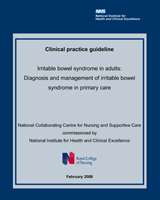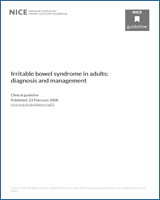NCBI Bookshelf. A service of the National Library of Medicine, National Institutes of Health.
National Collaborating Centre for Nursing and Supportive Care (UK). Irritable Bowel Syndrome in Adults: Diagnosis and Management of Irritable Bowel Syndrome in Primary Care [Internet]. London: Royal College of Nursing (UK); 2008 Feb. (NICE Clinical Guidelines, No. 61.)
Update information March 2017 Recommendation 1.1.1.2 in the short version was updated by NICE with more recent guidance on recognition and referral for suspected cancer. Recommendation 1.1.1.3 in the short version was removed as it was no longer needed after the changes to recommendation 1.1.1.2. February 2015 NICE has made new recommendations relating to the clinical management (dietary and lifestyle advice, and pharmacological therapy) of people with IBS. The recommendations and evidence in sections 3, 7.6, 8.4, 8.5.2 and 9.1 of this guideline that have been highlighted in grey have been stood down and replaced. New recommendations on dietary and lifestyle advice, and pharmacological therapy, can be found in the irritable bowel syndrome in adults update CG61.1. September 2012 A recommendation in this guideline (see pages 28 and 37) has been partially updated by recommendation 1.1.2.1 in 'Ovarian cancer' (NICE clinical guideline 122, 2011).

Irritable Bowel Syndrome in Adults: Diagnosis and Management of Irritable Bowel Syndrome in Primary Care [Internet].
Show details1. Tricyclic antidepressants, SSRIs and SNRIs
Are low-dose tricyclic antidepressants (TCAs), SSRIs and SNRIs effective in the treatment of IBS as a first line therapy, and which is the more effective and the safer option?
Why is this important?
Reviews have shown that TCAs and SSRIs have each been compared with placebo, but not at low dose. In practice, TCAs are used at higher doses and concordance with treatment is poor because of side effects. GDG clinicians believe that at low doses (e.g. 5 to 10 mg equivalent of amytriptyline), TCAs could be the treatment of choice, but there is a lack of evidence. Newer antidepressants, SNRIs, maybe useful in the treatment of IBS pain. A large randomised trial is proposed, comparing an SSRI, a TCA, an SNRI and placebo. Participants should be adults with a positive diagnosis of IBS, stratified by type of IBS and randomised to treatments. The primary outcome should be global improvement in IBS symptoms. Health related quality of life should also be measured. Adverse effects should be recorded. Study outcomes should be assessed at 12, 26 and 52 weeks after the start of therapy.
2. Psychological interventions
Are psychological interventions (psychological therapy, hypnotherapy and CBT) equally effective in the management of IBS symptoms, either as first line therapies in primary care, or in the treatment of people with IBS that is refractory to other treatments?
Why is this important?
Reviews show some evidence of effect when comparing psychological interventions with control, mainly in people with refractory IBS. Many trials are small in size. The psychological interventions of psychological therapy, hypnotherapy and CBT are thought to be useful in helping people with IBS cope with their symptoms, but it is unclear at what stage these should be given, including their use as first line therapies in primary care. A large randomised trial is proposed, comparing CBT, hypnotherapy and psychological therapy (psychodynamic interpersonal therapy). Participants should be adults with a positive diagnosis of IBS, and they should be stratified into those with and without refractory IBS and then randomised to treatments. The primary outcome should be global improvement in IBS symptoms. Health related quality of life should also be measured. Adverse effects should be recorded. Study outcomes should be assessed at 12, 26 and 52 weeks after the start of therapy.
3. What factors contribute to refractory symptoms in IBS?
Why is this important?
Most individuals with IBS experience symptoms that are relatively short lived or only trouble them on an intermittent basis. Some people, however, develop chronic and severe symptoms that are difficult to treat. There are relatively few prospective studies that have investigated this problem.
A large, prospective, population based cohort study is proposed, which would evaluate people in the community with IBS symptoms, according to measures of bowel symptomatology, physical symptom profile, psychological symptoms, childhood adversity, past history of psychiatric disorder, social supports, quality of life and other relevant potential predictors. Individuals would be re-evaluated 12 and 24 months later using similar measures. Baseline variables would be used to predict chronicity of symptoms, quality of life and healthcare utilisation at 12 months and at 24 months.
4. Relaxation and biofeedback
What is the effect of relaxation and biofeedback therapies on IBS symptoms and patient-related outcomes?
Why is this important?
Reviews of biofeedback and relaxation therapies suggest a positive effect on the control of IBS symptoms, but evidence is limited and not sufficient to make recommendations. Patient representation within the group supports this view, from a personal and anecdotal perspective.
Recent developments in computer-aided biofeedback methods merit investigation. A large randomised trial is proposed to compare relaxation therapy, computer-aided biofeedback therapy and attention control in primary care. Participants should be adults with a positive diagnosis of IBS, and they should be stratified into those with and without refractory IBS, and then randomised to treatments. The primary outcome should be global improvement in IBS symptoms. Health related quality of life should also be measured. Adverse effects should be recorded. Study outcomes should be assessed at 12, 26 and 52 weeks after the start of therapy. Qualitative data should be generated relating to how people with IBS perceive their IBS condition.
5. Herbal medicines
Are Chinese and non Chinese herbal medicines safe and effective as first-line therapy in the treatment of IBS, and which is the more effective and safer option?
Why this is important
Reviews of herbal medicines suggest a positive effect on the control of IBS symptoms, but evidence is limited and not sufficient to make recommendations (8 comparisons from the six trials provides heterogeneous data which are very difficult to interpret). A large randomised placebo controlled trial is proposed, comparing Chinese and non Chinese herbal medicine, single and multiple compounds, which should be available within the UK as standard preparations. Participants should be adults with a positive IBS diagnosis and should be stratified by IBS type and then randomised to treatments. The primary outcome should be global improvement in IBS symptoms, with symptom scores being recorded using a validated scale. Health-related quality of life should also be measured, and adverse events recorded. Study outcomes should be assessed at 12, 26 and 52 weeks post-intervention.
- Recommendations for research - Irritable Bowel Syndrome in AdultsRecommendations for research - Irritable Bowel Syndrome in Adults
Your browsing activity is empty.
Activity recording is turned off.
See more...
